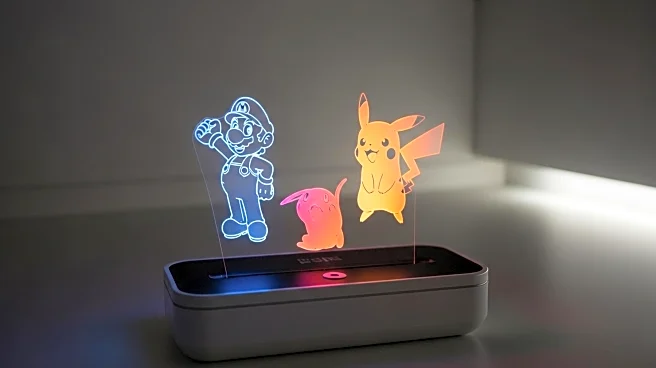What is the story about?
What's Happening?
OpenAI has launched the Sora 2 generative video app, which has quickly gained attention for its ability to create videos featuring licensed characters such as Mario and Pikachu. The app allows users to generate AI-driven content that includes these popular characters in various scenarios, such as Mario in 'Star Wars' or Pikachu in 'Saving Private Ryan.' This development has raised questions about the legality of using intellectual property in AI-generated content. OpenAI has reportedly contacted movie studios and intellectual property owners to discuss potential next steps and offer them the option to opt out of having their characters featured in Sora 2's videos. The app's launch has sparked widespread interest and debate over the implications of AI technology in entertainment.
Why It's Important?
The emergence of AI-generated videos featuring popular characters like Mario and Pikachu highlights the growing intersection between technology and intellectual property rights. This development could have significant implications for the entertainment industry, as it challenges traditional notions of copyright and licensing. Companies like Nintendo and The Pokémon Company may face new legal challenges in protecting their intellectual property from unauthorized use in AI-generated content. The situation underscores the need for clear legal frameworks to address the use of AI in creating content that involves copyrighted characters. As AI technology continues to advance, industries must navigate the complexities of intellectual property rights to ensure fair use and protection.
What's Next?
The legal landscape surrounding AI-generated content is still evolving, and stakeholders such as OpenAI, Nintendo, and The Pokémon Company may need to engage in discussions to establish guidelines for the use of intellectual property in AI applications. Potential legal actions could arise if companies decide to pursue claims against unauthorized use of their characters. Additionally, OpenAI may need to refine its policies to address concerns about the output of its generative video app. As the technology progresses, industry leaders and legal experts will likely continue to explore solutions to balance innovation with intellectual property protection.
Beyond the Headlines
The use of AI in generating content featuring licensed characters raises ethical questions about creativity and ownership. It challenges the traditional roles of creators and consumers in the entertainment industry, potentially leading to shifts in how content is produced and consumed. The situation also highlights the need for ethical considerations in AI development, ensuring that technology is used responsibly and respects existing intellectual property laws. As AI becomes more integrated into creative processes, stakeholders must consider the long-term cultural and legal impacts of these advancements.


















